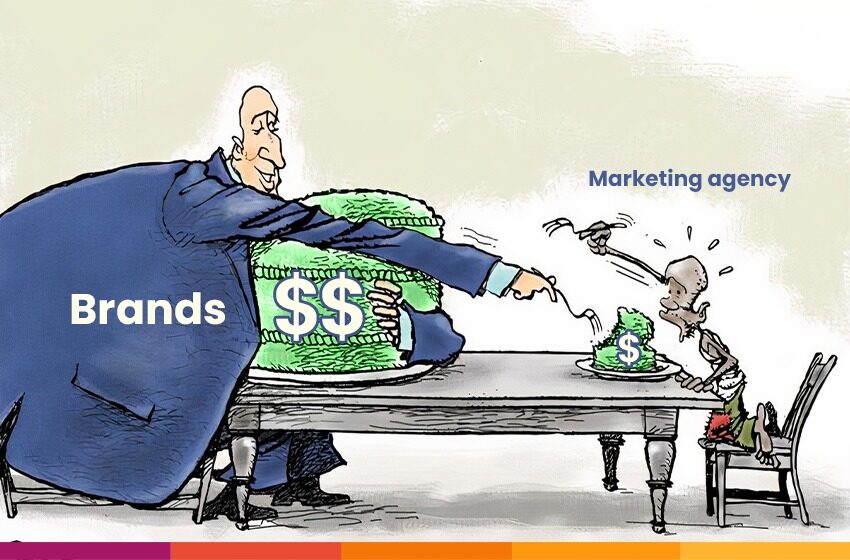
Brands frustrating media and advertising agencies with non-payment!
Multiple workshops, events and interviews talk about the need for growth in entrepreneurship in Nepal. While we see this happening in real time in our neighboring countries and the dividend it has brought to their respective economies, Nepal’s entrepreneurship culture is still in its fetal stage. The most important aspect for a budding entrepreneur, that is often overlooked, is money circulation. A small startup cannot bear to offer long running credit service to its clients. Flow of money is imperative for a startup to not only grow but handle day to day operations. However, brand’s lethargy in payment for delivery of service to its clients is a less talked about issue because it is a B2B( Business to Business) transaction . In this article, we will indulge in a case study particularly focusing on media agencies that have become plagued with this regressive business culture of Nepal.
Media agencies are vital to brand building and marketing. It is through the creative advertisements and marketing that these agencies provide to a brand that they become successful in being a household name. In spite of this, however, brands have often frustrated media agencies for non-payment. Nischal Kattel, CEO of Transtech Media and Advertising, says:
A brand that we worked with recently has withhold our payment for more than 3 months. As a relatively new business, this has seriously impacted our day to day operations, and inevitably led to creative restrictions in our work!
Transtech Media and Advertising
Additionally, Shyam Shrestha, CFO of Kathmandu Media, says:
In spite of having worked in this industry for more than 8 years, this culture of brands delaying payment continues to be a rampant issue. This creates logistics and operational hurdles in our work. As a business, we would be more motivated to creatively work and expand if we got paid for our services on time. There are multiple smaller businesses like laborers, vendors, deliverers who rely on us for their business. Not being paid on time, restricts our ability to pay our B2B clients on time as well, thereby furthering this vicious cycle. Big brands should be cognizant of the fact their non-payment to one media agency creates a negative chain to multiple businesses.
Kathmandu Media
Brands often shy away from signing confidentiality clause and financial contracts. Kashyap Shakya, co-founder at PYCUS Nepal also recently bemoaned about a national payment brand blatantly copying their pitch. While the brand ‘rejected’ their pitch, they ended up co-opting the creative pitch. Forget about payment, the brand did not even give credit. Even when the contracts are in place, brands show total disregard to agreements because B2B is not a consumer facing model. Ergo, media portals have also shied away from reporting on this menace, because it does not serve as a proper ‘clickbait’ topic.
Regulatory institutions like AAN are also busy calling for lifting of restrictions on alcohol advertisement but mum when it comes to non-payment issue. How can we expect our advertisement industry to grow when our own institutions turn a blind eye to this pertinent issue? One can clearly see that big brands have a total disregard to Nepal’s rule of law. Whether it is about advertisement of alcohol and tobacco; whether it is about evading tax like Bottlers Nepal; or whether it is about withholding payment in spite of legal contractual obligations, big brands in Nepal are confident that they can flout any existing laws. When our government is corrupt and our institutions, supposedly dedicated to promote advertising industry, are complicit or silent in such business culture, we can expect for startups to increasingly fail.
Brands when they engage in D2C business (Direct to customer) seldom provide credit services. Even when they do, they make you all sign multiple contracts and surprisingly these contracts are enforced through governmental and financial mediums. Moreover, they charge ample interest for credit service. However, when it comes to brands engagement with media agencies, contracts seldom stipulate agency’s ability to collect debt through enforcement mechanisms. In spite of agreements, media agencies are at the mercy of brand’s generosity for payment. Mr Kattel, states that this business culture has created a situation where while the business is good on paper, keeping the agency just afloat has become arduous, He further states that:
If this business culture from corporate clients continue to choke the media agencies, agencies need to come together and publicly ‘name and shame’ these brands. We put in our sweat, toil, blood and creativity to build and foster a brand’s image. If they continue to disrespect our industry, they should be cognizant that we can hit the arrow on its head too. For this, media agencies need to band together. Of course we are competitors in our own right, but we need the playing field to be even and fair.
Transtech Media
There is a silver lining in this conundrum. Public institutions like corporate banks are known to be very disciplined in terms of payment. Private sector keeps crying wolf that governmental regulations and operations are problematic for business. While we agree on this partly, at least these public institutions have kept their contractual obligations. Of course, even talking from agencies’ perspective, there is a need for a more robust protectory mechanism. However, there needs to be a radical shift in private sector’s business culture as well. Governmental/ Public sectors are weaker on the D2C front while private sectors are good there. However, like we mentioned above, self-reflecting on B2B business practice from private sector needs serious thought.
BrandGuff is created with the motive to foster private sector with a particular focus on brand perspective. That said, we refuse to act as a lobby for any sector. We also strive to be a brand watchdog. Brands and businesses often have the propensity to deflect all the blame on the government. Governmental regulations can serve as a guideline, but we also need to realize our own demons. Continuing to engage in unethical and counter-productive business practices like non-payment, tax evasion and intellectual property theft will hamper our budding marketing sector and entrepreneurship. We intend to serve a gentle reminder to brands that have engaged and fostered this business culture. That said, we serve a stern warning that we won’t hesitate to ‘naming and shaming’, if push comes to shove.




